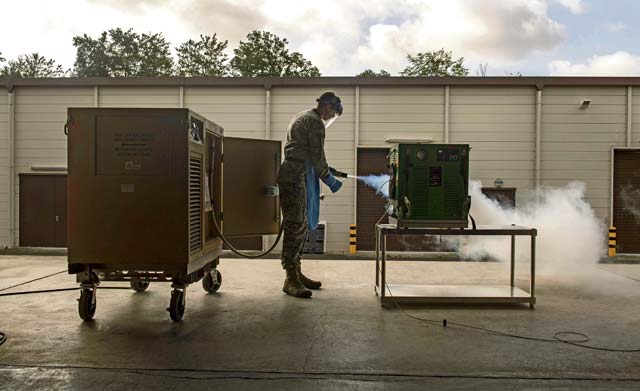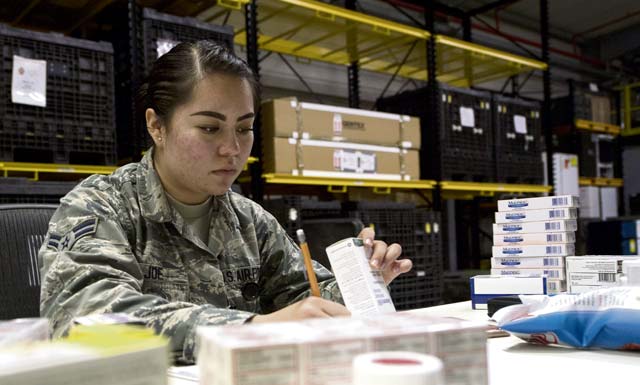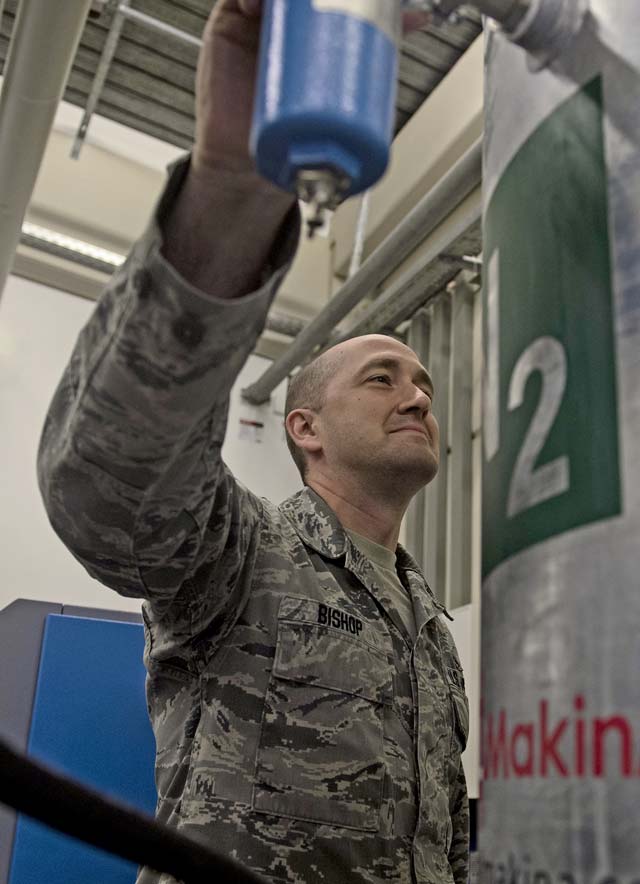
When an Airman or dependent goes to the doctor, picks up a prescription at the pharmacy, or attends a self-aid buddy care course, they may not think about where the medication, supplies, and equipment come from to make all those things possible.
The 86th Medical Support Squadron provides peacetime and wartime support of medical supplies and equipment on Ramstein and in deployed locations such as Iran, Iraq, and Afghanistan.
“Medical supply can be looked at in many ways, like general medical care such as gauze and gloves, to training,” said Staff Sgt. Justin Ward, 86th MDSS noncommissioned officer in charge of medical material service. “For example, security forces, SABC monitors, everyone else who need to train on medical items such as tourniquets; they go through us because we are the mandatory source when it comes to approval. We support both the medical group and anyone else across the base that needs medical items.”

The 86th MDSS is not limited to providing support for entities with the 86th Medical Group. Any organization that uses any type of medical equipment or supplies is serviced by the squadron.
“We have a hundred customer accounts we maintain, whether it be the pharmacy, flight medicine, physical therapy, security forces, the contingency response group, the Federal Bureau of Investigations when they do missions out here, the POW missions,” Ward said. “Anyone you can think of that has to come through Ramstein for medical support, we support them.”
One aspect of the squadron’s mission is to repair and calibrate all medical equipment used by aeromedical evacuation Airmen to support their patients. If anything is broken on the equipment, the Airmen service them, mark it down in their tracking system, and scan it into ready status stating it is good to go to ship out to the next people.
“All the stuff that comes in, like one with a broken screen, you can’t really service the patients,” said Senior Airman Dustin Johnson, 86th MDSS biomedical maintenance technician. “The medical technicians are only as good as the equipment they use, and without the equipment, they really can’t help anyone. I believe what we do here has a giant impact on the mission. I love my job.”
The squadron also houses all the medical supplies needed to support the medical group and any other organization on Ramstein or a deployed location may require in their war reserve material unit. They are responsible for maintaining and shipping over $30 million worth of equipment and supplies.
“We house medical supplies and equipment that save people’s lives,” said Airman 1st Class Breanna Jannarone, 86th MDSS medical logistician. “I’m not operating on you directly with my own two hands, but I’m providing the supplies so it can be put in doctor’s hands. I’m the one making sure if this goes out, it’s a hundred percent correct. I’m accountable for it, that’s my package. I make sure everything you need to survive is in there.”
The war reserve material unit not only supports Ramstein and deployed locations; they work with U.S. NATO partners to share best practices. In 2016, three 86th MDSS Airmen went on a temporary duty to Slovakia to work and train with their medical service members.
“We had some of our own go on a temporary duty to help set up tents, the computer program we use, and show how to do the logistics side of everything we do here but on a much smaller scale,” Jannarone said. “They trained our NATO partners to show them what we do and how they can also have similar programs and ways to manage their items.”
Innovation is the key to the Air Force, and the 86th MDSS also strives to find better ways to complete their mission. To better support their aeromedical evacuation customers, the squadron purchased a nitrogen generator and oxygen generator and liquefier to streamline a process frequently required by the customer and make it all occur in house. The new system cut the time down from three weeks to two to three days and saves the Air Force approximately $7,000 a month.
Whether it’s repairing equipment, storing and shipping supplies, or refilling equipment the 86th MDSS Airmen do their best to provide life-saving products to those who need them.
“It’s a rewarding job, because I know I’m able to support the big picture,” Ward said. “Some see it as you’re only doing one thing, but I see it as I’m supporting someone in the long run.”
Saving a life can be anything from having a tourniquet on hand when a fellow Airman is injured in an austere location to providing a prescription to an Airman or dependent who needs it. Neither of these or anything in between could be done without the aid of the 86th MDSS Airmen.



